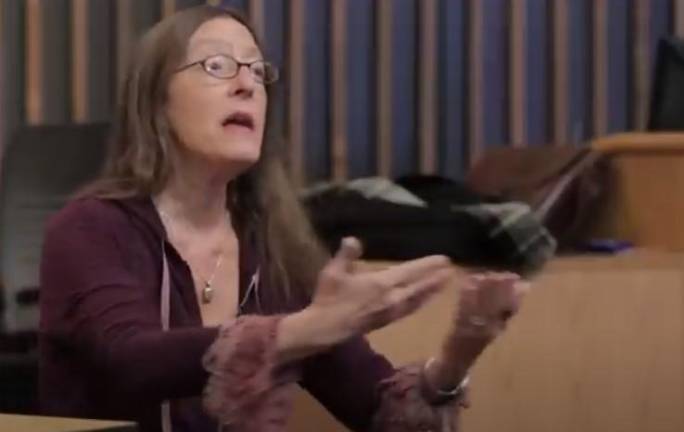This Is Not Time of Peace Let Margolin Explore Complicated Relationship with Her Father
The playwright explored her complicated relationship with her scientist father in the play that had a successful run on Theater Row and closed March 16.

Playwright Deb Margolin always wanted to write about her father. A scientist working with titanium, he had been “named” in the blacklisting days by Joseph McCarthy. And, not unlike a guy named Oppenheimer, he lost his security clearance and was prohibited from continuing important research. When her dad died recently, at 100, Margolin figured this was her moment.
The result is a new play, “This Is Not a Time of Peace,” which had its world premiere recently at Theatre Row. “This one is dear to me,” she said. “I’ve written about my childhood, and my husband, but this is the tribute to my father now.” She admits she was “trembling” over how this production will do, but feels it matters more than ever now: both personally and politically.
The production was from the New Light Theater Project, and was directed by Jerry Heymann. He came aboard, he said “because I’m old enough to remember Joseph McCarthy, the story is interesting, and there’s a form of music in Deb’s dialogue.” Such as: “I grew up with these stories, his stories, the whole house smelled of fear, and his trauma is mine now. Sometimes I wonder if suffering dulls along with everything else in old age.”
Heymann said, “There were challenges, particularly focusing on a man starting to suffer from dementia, and we wonder what actually did or didn’t happen.”
In her research, Margolin discovered a man named Adolf Berle, who had been Under Secretary of State to FDR. He turned out to be a key and somewhat heroic figure in the life of her father. There are seven characters in the play, (including Joseph McCarthy) and tough issues, including the daughter’s own complicated love life.
In her writing, the playwright often touches on the subject of Judaism. (In this play, the husband’s name is Moses) A previous work, “Imagining Madoff,” played at Washington’s Theatre J and drew some–ultimately unfair–criticism from Elie Wiesel. A prestigious New York attorney, Victor Kovner, handled that for me pro-bono,” she said. “When I offered him money, he said, ‘use it to help someone else’.” The kind of spirit and support we hear too little of–dare I say this is not a time of such generosity?
Not unlike another recently closed off-Broadway piece, “Russian Troll Farm,” “This is Not A Time Of Peace,” is historical, (from 1950 through three other periods) and included a long monologue by a leading female character, and has what Margolin called a sense of “disquieting immediacy.” In other words, it happened then but feels like now.